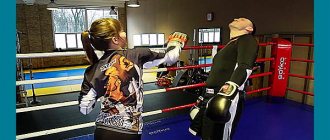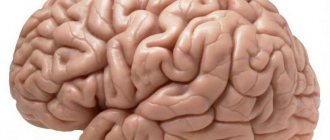Good afternoon Over the past year, after my father’s death, I began to notice that I was very often worried and afraid of something. As if something irreparable was about to happen. I'm tired of living like this, tired of waiting for trouble. I am constantly afraid for my loved ones, for myself. I try to distract myself with something, but it doesn’t help for long. My husband doesn’t understand what’s happening to me, he’s even angry at me. And I see that this is already affecting my health - I have headaches, everything annoys me and I don’t want to see anyone. How to get rid of the constant feeling of fear and start living normally? Olga, 45 years old
Hello Olga! The problem of obsessive anxiety, feelings of fear, is very common and not as harmless as it might seem. We are so used to living in speed, changing scenery, with frightening news in the background, that we do not have time to cope with constant stress. Anxiety has become our everyday companion and no longer seems unusual, but it is not. The normal state is calm, confidence and the absence of unnecessary worries. Let's try to figure out what's happening to you and how it can be solved.
Fact or fiction - what's the reason?
Anxiety can be based on real or fictitious facts. The truth is what happened to you or can happen for real reasons. You have experienced the death of a loved one. Your anxiety is rather about the fact that this could happen again, and you cannot influence it. This is adequate anxiety, but this does not mean that you do not need to fight it.
Sleep disturbances, nervousness and signs of depression are a somatic reaction to fear.
You subconsciously want to solve a situation that has not yet happened. But the illusion of control is that a person is not able to completely control everything. None of us knows when we will die and cannot project the possibility of accident or illness. Therefore, identifying oneself with a situation that may not happen does not mean control, but self-destruction.
It happens that anxiety is not caused by certain stressful events; the causes of anxiety and feelings of fear are unconscious. In this case, we are talking about inadequate, excessive anxiety. It can be triggered by events that were not considered by the psyche as stress. For example, problems in the family that you do not attach importance to. Your husband reacts to your fears with irritation, this offends you, but you will not contradict him, believing that you are wrong, overly anxious, and he is just reasonable and adequate.
Here is a situation of a vicious circle of excessive anxiety, which is spurred on by depreciation from others. In fact, you need support and help and have every right to it.
Problems at work can also be causes of obsessive anxiety. Injustice, unhealthy competition, high responsibility and the inability to change the situation form an obsessive anxiety state.
Sometimes the body generates anxiety, making it clear that there is some problem. In such cases of causeless anxiety, it is recommended to consult a doctor for a standard medical examination.
Fear and its meaning
Fear is one of the key ancient instincts that allows a person to avoid danger. When a threat hangs over us, a large amount of adrenaline is released into the blood, and we begin to act on the “fight or flight” principle.
The amygdala, which is a key part of the limbic system, plays a special role in the generation of fear and a number of other emotions. In patients with Urbach-Wiethe disease, destruction of the tonsils is observed, as a result of which, probably, these people cease to experience fear.
Urbach-Wiethe disease was first described in 1929 by doctors Erich Urbach and Camillo Wiethe. However, even before them, at the beginning of the 20th century, specialists described several cases. Some time after the discovery of the disease, it was found that the pathology is hereditary. Urbach-Wiethe disease is a recessive genetic disease that is currently very poorly understood. The exact causes of hereditary disorders are still unclear, and it is also difficult to assess the likelihood of having a child with such a diagnosis.
Since its first mention, only about 300 cases of Urbach-Wiethe disease have been reported worldwide. Although the disease can be found on all continents, more than 25% of cases occur in South Africa. According to statistics, the majority of patients are of Dutch, German origin, and the Khoisan people (inhabiting the territory of South Africa) also suffer from Urbach-Wiethe disease.
How to deal with the tired feeling of anxiety?
- If past stress and health problems are excluded, and the condition does not improve, it is recommended to consult a specialist. You will be able to work through your individual case and select all possible means, including medications, to correct the situation. There is no need to be ashamed of your anxious state, much less ignore it.
- Take care of yourself. Adequate sleep, a change of impressions (in any format possible now), communication with pleasant people, a healthy varied diet, a new hobby - these are not trifles, but the very factors that contribute to the normalization of the emotional background.
- Eliminate stress if possible. What happened has already happened. You need to experience it, get over it, mourn it, under no circumstances ignore it and let it go. This will happen anyway, perhaps now is not the time. Now you need to try to protect yourself from what irritates and worries you: daily news, toxic friends, aggressive colleagues.
- Listen to yourself. Your body needs help, and not to overcome the daily “I can’t get through it.” Listen, maybe you don’t want to do anything right now. Perhaps you can finish this later or ask for help. By listening to yourself, you can become aware of what feelings are causing you to worry and get rid of them.
- Don't be shy to ask for help. And this primarily concerns home life. Ask your loved ones to help, don’t put everything on yourself. The body does not like such experiments and responds accordingly.
Remember that an anxious state cannot be ignored.
You can successfully work through a lot of things on your own. In addition, you can always turn to a specialist and get rid of anxiety and feelings of fear. anxietyanxiety
The body remembers everything: where the fears were hidden. Psychosomatic map of fears
“The body remembers everything” - this is one of the laws of body-oriented psychotherapy. The body stores all the memories and emotions we experience. Feelings and fears that a person ignores result in health problems, and if you continue to ignore them, more and more such problems will appear. Each part of the body is responsible for certain human fears, and depending on where the unpleasant sensations arise, you can determine what the person is afraid of.
Our consciousness does not want to acknowledge some feelings, so they scatter throughout the body and settle in certain places. This mechanism in psychology is called “repression.”
In the unconscious, painful experiences, thoughts and memories, including a person’s fears, are repressed. To remind themselves, they transform into illnesses - thus, hidden feelings try to attract attention to themselves.
How to draw an individual bodily map of fears?
You will need a blank sheet of paper and drawing tools (preferably not felt-tip pens and pens that draw clear outlines, but something that can draw unclearly - pencils, brushes, crayons - drawing in spots without clear outlines may be much simpler and easier for you; although, if you can localize the sensations clearly, do it with a pen). Draw your body.
- Closing your eyes, try to feel your body. Do you feel tension? Are you comfortable? Do you feel warm?
- As you continue to feel your body, ask yourself: “Where does fear live in my body?”
- Mark in the picture the places where fear lives. There may be several such areas, somewhere a person’s fear is expressed more, somewhere less - you can express this with the help of flowers.
Body map of human fears: where the experiences are hidden
- Legs . Pain in the legs may indicate a fear of losing stability and support. A person does not feel confident in the future.
- Pelvis . Problems in the pelvic area indicate a person’s fears in the sexual sphere. This fear provokes the development of various diseases, and also prevents women from achieving orgasm.
- Belly . Discomfort in this area is due to a person’s fear for life. Perhaps the life-threatening situation was not real, but even when the danger passes, it remains relevant for the unconscious. Due to this, it is not possible to achieve complete relaxation and feel safe.
- The area of the diaphragm, including the stomach and solar plexus . Social fears have taken hold in this zone. A person's fear of being rejected by society.
- Rib cage . In this zone, the map of fears reflects a person’s fear of loneliness; the person is afraid of being rejected as an individual.
- Hands . Through this part of the body, a person’s fear of contact with the world is expressed. Often people who hide this fear choose a profession where they do not need to communicate with others. Problems with the brushes indicate problems with communication. The right hand indicates the fear of men, and the left - women.
- Back . Discomfort in this area indicates that a person is afraid of appearing imperfect, not meeting the expectations of others. Perfectionists often face this problem. As for the shoulders, they symbolize responsibility and strength. Pain in this area is associated with a person’s fear of being weak or not being able to cope with responsibility.
- Neck . Frequent sore throats, a feeling of tightness and tickling haunt people who find it difficult to express their feelings. Constant tension in the neck occurs because every time feelings want to come out, the neck contracts and keeps them inside.
- Face . On the bodily map of fears, the face symbolizes the fear of “losing face.” Such people need love and approval, so in order to please everyone, they have to constantly wear masks.
- Eyes . Fear of reality affects one of the main channels of perception. A person refuses to see the truth, which results in vision problems.
Emotions cannot be kept to yourself; secret fears are the cause of most diseases. By coping with your inner experiences, you can get rid of health problems.
Source
Fear lives in the legs: a mirror reflection in emotions in our body
Imagine: you are sitting in the control room of a huge nuclear power plant and, as soon as one of the hundreds of available devices begins to blink, ring or otherwise give you an alarm signal, you turn it off in annoyance - so as not to irritate you. Or - if you have Scandinavian composure - you don’t turn it off, but continue to calmly solve the crossword puzzle. You don’t have to describe the consequences - your imagination will tell you.
You wonder - what kind of wild fantasy? But this, to put it mildly, careless dispatcher is you. Don't believe me? Our body is such a complex and perfect mechanism that a nuclear power plant, compared to it, is like an elementary sewing machine: after all, man designed and built it a long time ago, but, thank God, he hasn’t gotten around to creating his own body from one single cell yet.
And this sophisticated mechanism constantly talks to us, every second gives us various, and vitally important , signals - “Don’t eat so much sweets!”, “You can’t stand this person!”, “Finally, give me a break!” - and others, much more complex. And how do we react to these signals?
At best, we go to the doctor - let him treat us with pills and injections; at worst, we “pull ourselves together” and try to continue living as if nothing is happening. At the same time, we do not make a single attempt to communicate with our own body - and by the way, under no circumstances is it capable of acting to our detriment. How are we different from the notorious dispatcher? Perhaps only by the scale of the disaster. And even then only at first glance - we are the only ones on our own.
What does our dispatcher urgently need to do while he is still alive?
Right. Study the instrument readings and remember what they mean. After all, our ancestors once knew how to do this. “This gives me a headache”, “grind my teeth with rage”, “tears form in my throat”, “swallow the insult”, “carry it on my shoulders”, “breathe deeply”, “goosebumps run down my back”, “ not sparing your belly”, “your knees are shaking from fear”, “to stand firmly on your own two feet”... This is exactly about them - about the signals of our body.
And to understand what they mean, you only need to know the law of conservation of energy. Simply put: everything that happens in our body is exclusively purposeful - otherwise why would we waste energy? - and if the body lacks one thing, there is no doubt that it will make up for it in another. Let's try to see this in the most familiar, everyday manifestations of our body.
Imagine a fallen three-year-old whose mother is absolutely convinced that well-behaved children should not scream loudly. Having hit himself, the little man cries, as expected, and his mother, like an angry fury, hisses: “Shut up now!” The baby is hurt, hurt, and most importantly, scared: his mother doesn’t love him now!
The child, of course, is not yet able to form the simplest conclusion: “When I freely express my feelings, my mother does not love me, which means I need to restrain these feelings.” However, if such a scene is repeated - and, unfortunately, it usually is repeated - the child learns this lesson at least at the level of a simple conditioned reflex. And after some time he will try to restrain his rightful roar of pain. And his tiny body, in order to help its owner, will begin to strain and squeeze his neck, so as not to let out seditious tears.
As an adult, the former three-year-old toddler will definitely experience the most serious difficulties in expressing the simplest and most natural feelings - declaring his love, shouting, crying... Mom may no longer be alive, but her lessons, alas, are effective. A person swallows tears, words, screams, resentment, he is choked by anger - and all this, by the way, is in full accordance with folklore. And all because at the right moment, a tension that has already become familiar and imperceptible arises in his throat, which prevents all of the above from breaking out. So much for the law of conservation of energy.
Earnestly?
However, it could be different. Do you happen to know a dentist? If so, ask if he has come across patients with teeth worn down to the very root? It is unlikely that he will say that every second person is like that, but he will definitely remember a few people. By the way, have you personally, after some difficult conversation, when you were forced to remain silent, holding back your anger, feel tired in your jaws?
Now imagine that for someone, gritting your teeth and enduring is a habitual way of behavior, the only possible option for reacting to any negative emotions. Feelings are bursting out, and for some reason he once decided for himself that he would never let them out.
That is, his head decided it - it understands so well what is good and what is bad! And the poor, trouble-free body helps her - but, by the way, to its own detriment. After all, only the head, trying to make decisions on its own, is capable of harming us - without its help the body usually does not succeed (remember how painfully Martin Eden at the end of the book tries to deceive his body and still drown himself).
It would seem so simple - a person read these lines, realized everything and wanted to try differently: “That’s it, from tomorrow I say what I think, cry and scream when I want, and throw out my aggression on those around me in bucketfuls.” No matter how it is... At the decisive moment, it doesn’t matter either your voice will fail, or you won’t be able to unclench your teeth, or the words will get stuck in your throat. Do you know why?
SCARY
After all, it is fear - whether we realize it or not - that is behind the inability to express our feelings - the fear of being rejected, misunderstood, lonely, funny, not like everyone else... Remember, by the way, “your knees shake from fear”? Moreover, the psychological meaning of this expression is most closely related to what is hidden in the saying “to stand firmly on your own two feet.”
The importance of legs is obvious from elementary mechanics: legs are what we can lean on in life (whatever it is - our loved ones, profession, ourselves...). What happens to us when there is no support? That's right - we're scared. We lose our peace of mind.
But a person is something whole, and everything that happens in our soul inevitably receives its mirror image in the body . We, without knowing it, begin to strain our legs, trying to feel for additional support under them, to physically compensate for the lack of confidence, protection, and security. Hence, at best, trembling knees, and at worst, constant joint pain, as doctors say, of “unclear etiology,” chronic fatigue in the legs and other troubles.
And this is where one extremely interesting question arises. Let’s say a person in these situations finds out his problems - what should he do with this information?
The answer is simple: and here the main assistant is your own body. How to turn to him for help, how to be able to hear an answer, how, finally, to take advantage of this help - this is a topic for conversation with a psychologist. And not with just any psychologist.
It turns out that there is such a fascinating area of psychological knowledge - body-oriented psychotherapy. And don’t be afraid of the word “psychotherapy”; it most often has nothing to do with mental illness, but with the most common problems – ours.
Surely you found something painfully familiar in the above sayings? And body-oriented psychotherapy - unusually pleasant, by the way - can give you access to those endless resources that are hidden in one of the most perfect creations of nature - our body , so dear and - seemingly - familiar.
Interesting? Still would! Do you want to try it yourself first? Just keep in mind that without the deepest and most sincere attention and absolute and respectful trust in your body, you shouldn’t even try. Nothing will work out.
So, have you made up your mind? Do you have interest and love for your own body - whatever it may be? Then let's begin.
PRACTICE:
Allow two hours for our experiment - preferably at the beginning of the day. It is important that your thoughts during these two hours are occupied only with your body. Other problems will wait. If they don’t want to wait, postpone the experiment until better times.
You are at home alone, comfortably dressed - or completely undressed; The main thing is that nothing rubs, stings or distracts anywhere. You don't need music at all in this situation. Even turn off your phone.
First - and perhaps most difficult: find the position that is most comfortable for you. Not the most familiar, but the most convenient at this very moment. Try not to invent a pose, but rather look for it with your body. Look for it slowly, tastefully, letting your body feel each option.
When you feel that every part of the body is in complete comfort and does not want anything else, you have found what you are looking for. Now stay in this pose for some time. Take a kind of excursion - what is tense in your body now, what is relaxed; where it’s warm, where it’s cool, and where it’s even hot; what areas of the body come into contact with other objects - clothing, floor, chair, wall, carpet, etc.; which of these touches are stronger and which are weaker.
Your consciousness is now just a dispassionate recording device, and there is nothing bad or good, right or wrong in your body. It is what it is. Try to treat him this way for the first time in your life. How do you like this?
Do you think it was an exercise? Nothing like this. For now, you just said hello to your body and paid tribute to it. You want it to help you get to the emotions that until now you have struggled to bury in it? Then, as we remember, we need to start with fear. That is, from the feet.
Very slowly, continuing to observe everything that happens in the body, stand up. Legs are almost shoulder-width apart, feet are parallel, knees are relaxed and slightly bent. Rock a little, still slowly, just to feel how subtly and precisely the muscles in your legs help you maintain your balance. You have something to rely on, don’t you?
Now imagine how high above the earth’s surface you are. Maybe you are separated from her by ten floors or only a basement - it doesn’t matter. Feel how the floor on which you rest your feet holds all your weight and prevents you from falling down there...
Did you feel how your body instantly filled with heaviness at this very thought? Wiggle a little more - how do your supports behave? Like? That's it.
Now, just as slowly, lower yourself to the floor and lie on your back. Bend your knees and place them firmly on the floor. Close your eyes and listen to your breathing.
Try relaxing your lower jaw and inhaling through your nose, exhaling through your slightly open mouth. And after a minute, do the hardest thing - add sound to the noise of exhalation. Any. Fill your entire exhalation with this sound. Hear your voice. And - continue to sound.
It may not work out right away - that's natural. We can lie with words, but we can’t lie with sound. It just won't work. Sound is our very honest self-expression. So it can be a little scary at first. Or maybe not. In any case, you are not risking anything now.
And when you manage to start sounding natural, and you finally start to enjoy it, experiment. Be as loud as possible - and then as quiet as possible. Taste your lowest sound, and then your highest, most unpleasant and most pleasant. And don’t rush, let yourself feel every new sound, every new sensation - because now you are expressing yourself! published
PS And remember, just by changing your consumption, we are changing the world together! © econet









